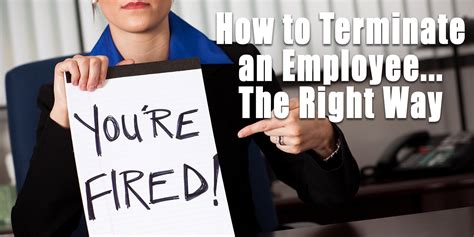Navigating Termination: What To Do When You're Fired

Getting fired can be a stressful and overwhelming experience. Whether it was due to a mistake you made or circumstances beyond your control, losing your job can have a significant impact on your life and future prospects. However, it’s important to remember that being fired is not the end of the road. With the right mindset and approach, you can navigate this challenging time and come out stronger on the other side. In this article, we’ll explore what to do when you’re fired and how to prepare for the next chapter in your career.
1. Take Time to Process Your Emotions
Getting fired can be a shock to the system, and it’s natural to feel a range of emotions in the aftermath. You may feel angry, sad, embarrassed, or even relieved. It’s important to give yourself time to process these emotions and come to terms with what has happened. Don’t be afraid to seek support from friends, family, or a therapist if you need it.
2. Review Your Employment Contract and Severance Package
Before you leave your job, it’s important to review your employment contract and any severance package that may be offered. This can help you understand your rights and obligations, as well as any compensation or benefits you may be entitled to. If you have any questions or concerns, don’t hesitate to ask your employer or a legal professional.
3. Evaluate Your Finances
Losing your job can have a significant impact on your finances, so it’s important to evaluate your financial situation and make a plan for the future. This may involve cutting back on expenses, applying for unemployment benefits, or finding alternative sources of income. It’s also a good idea to review your debt and savings, and consider speaking with a financial advisor if you need help managing your finances.
4. Update Your Resume and LinkedIn Profile
Now that you’re no longer employed, it’s a good time to update your resume and LinkedIn profile. This will help you stay top of mind with potential employers and showcase your skills and experience. Be sure to highlight your achievements and accomplishments, and tailor your resume and profile to the types of jobs you’re interested in.
5. Network and Apply for Jobs
Networking and job searching can be daunting, but it’s important to stay proactive and keep moving forward. Reach out to your professional contacts and let them know you’re looking for work. Attend industry events and job fairs, and apply for jobs that align with your skills and interests. Don’t be afraid to follow up with potential employers and showcase your enthusiasm and qualifications.
6. Consider Starting Your Own Business
If you’ve always dreamed of starting your own business, getting fired may be the push you need to take the leap. Starting a business can be challenging, but it can also be rewarding and fulfilling. Consider your skills, interests, and market demand, and develop a business plan that outlines your goals and strategies.
7. Take Care of Yourself
Finally, it’s important to take care of yourself during this time of transition. Make time for self-care activities that you enjoy, such as exercise, meditation, or hobbies. Surround yourself with positive and supportive people, and don’t be too hard on yourself if things don’t go according to plan. Remember that getting fired is not a reflection of your worth or abilities, and that you have the power to create a bright future for yourself.
Conclusion
Getting fired can be a challenging and stressful experience, but it’s important to remember that it’s not the end of the road. By taking time to process your emotions, reviewing your employment contract and finances, updating your resume and LinkedIn profile, networking and job searching, considering starting your own business, and taking care of yourself, you can navigate this challenging time and come out stronger on the other side.
FAQs
What should I do if I’m fired?
If you’re fired, it’s important to take time to process your emotions, review your employment contract and severance package, evaluate your finances, update your resume and LinkedIn profile, network and apply for jobs, consider starting your own business, and take care of yourself.
What are my rights if I’m fired?
Your rights if you’re fired will depend on your employment contract, state and federal laws, and the circumstances of your termination. It’s important to review your contract and speak with a legal professional if you have any questions or concerns.
How do I explain being fired to potential employers?
When explaining being fired to potential employers, it’s important to be honest and upfront about the circumstances of your termination. Focus on what you learned from the experience and how you’ve grown since then. Be sure to highlight your skills and qualifications, and showcase your enthusiasm and interest in the job you’re applying for.
